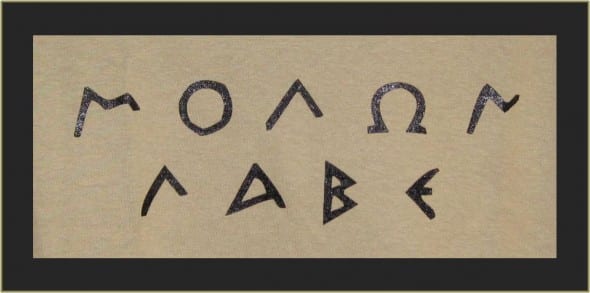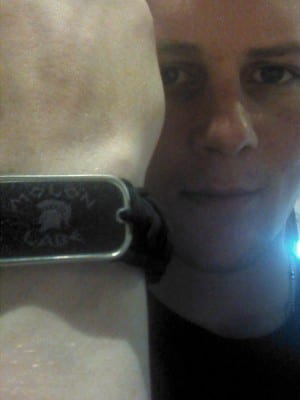
The Greek phrase “molon labe” (“come and take”) is being used as a rallying call for advocates of Second Amendment rights, and reflects a deep solidarity amongst citizens, soldiers, industry professionals, and more.
One side of two warring parties shouted out molon labe nearly 2,500 years ago—a defiance and a promise (in Greek) that surrender was simply not in their vocabulary. The cry from the Spartans to the Persians at the legendary Battle of Thermopylae was boldly come and take. A line drawn in the sand, we will not give you your victory—you must take it. Perhaps not much has changed in two-and-a-half millennia, for once again, this phrase is a very real line in the sand.
The sides now are ordinary, law-abiding citizens of the United States of America and…well…anyone who thinks they can infringe on Second Amendment rights. The words molon labe (prounounced mo-lan la-BAY) are now the rallying cry. It springs up from every corner of the earth where Americans breathe, from American Legions to hunting clubs to bases atop rugged peaks in Afghanistan. The old guys at the coffee clutch at the farm town C-store might not call out molon labe yet, but the younger guys do.
Soldiers whisper it. Veterans tattoo it to their bodies. Facebook cover shots boast it. It is worn on t-shirts, on jewelry, on key chains, and displayed on the backs of pick-up trucks. Our soldiers fight to keep America free against any and all who threaten her freedoms. If the cause is this, and time is now…so be it. Come and take.
Words mean something. With each generation there is an ebb and flow of new words, rich in meaning and nuance. Some are coined. Some become brand names that merge into our everyday life. They rise up from the common ground of the alphabet to provide unique cultural snapshots. Today, think of “Gangnam Style,” the Harlem shake, and sequestration. Other generations enjoyed new words like mouse, apple, and disco. I believe future archaeologists will look back on this era and dig from our vocabulary a phrase that took on significance and meaning. A phrase that solidified good people who love their country, a country that boasts a Constitution to limit the rights of the government, not limit the rights of the people. Somehow it has gotten a little bit backwards these days.
My son came home from serving a deployment in Afghanistan recently. He brought me a small gift—something that would fit on the plane in an Army duffel: a survival key chain with the phrase molon labe. While I had seen the words a bit on Facebook and as a tag line on some Internet forums, I wasn’t sure what it was all about. He told me the age-old story of the Persians and the Spartans and the parallel of today’s battle for our right to bear arms, to protect ourselves and protect our country.

Skyler with a “molon labe” survival strap.
“What happened while I was gone?” my son, Skyler, asked. “The silent majority has been silent too long. We need to find our like-minded people, band together and let the politicians know that this is not right.” Skyler updated his cover page for Facebook that night: molon labe.
Maybe my sense of proportion and scale on the importance of this phrase is exaggerated because of my son’s passion for serving his country and his recent return. I see the frustration in him. Some governing this country (or at the state or local levels) want to undo what he and many other brave souls over two centuries have defended–with a pen no less. Using late night, backroom, eve-of-holiday shenanigans concocted by politicians.
Perhaps it comes from attending SHOT Show in January then the solidarity and boycott of Eastern Outdoor Sports Show in Harrisburg over the modern sporting rifle ban. Adding to that, I just finished a great conference in South Carolina (Professional Outdoor Media Association–POMA) with industry folk this week. At POMA I asked if this phrase meant something to a number of the attendees—all hunting and fishing industry members. Anecdotally, for sure, the younger attendees could articulate it. The graybeards not so much.
So maybe this phrase won’t stay in the snapshot of today’s culture. Then again, perhaps this is the birth of the rallying cry that will make a difference. It begins from the 20- and 30-somethings on up: it is time to stand together and fight the battle at hand or we will surely lose our freedoms and, eventually, our very lives. Molon labe.
K.J. Houtman is author of the award-winning Fish On Kids Books series, chapter books for 8-12 year olds with adventures based around fishing, camping, and hunting. Available at Amazon and local bookstores. Find out more at fishonkidsbooks.com.
Images courtesy K.J. Houtman



